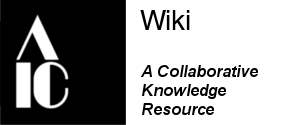Talk:BPG Sewing and Leaf Attachment
This page would benefit from someone cleaning up the links to the images and adding more images of sewing structures, in particular, images of how the various structures open.--Kkelly (talk) 15:55, 3 November 2016 (CDT)
An excellent addition to this page would be photographs of the reversed sewing supports (i.e., what is visible from the inside of the section after you pull (remove) the gatherings). This would help in identifying sewing during disbinding operations). Also a bibliography. Also an explanation of what "pretzel" sewing is. --Kkelly (talk) 09:12, 10 February 2017 (CST)
Abbreviated sewing?--Kkelly (talk) 11:23, 25 October 2017 (CDT)
Smyth sewing? Smyth-cleat sewing? See Roberts and Etheringon. --Kkelly (talk) 14:01, 15 January 2021 (CST)
References to add, linked from the appropriate section (from early BCC drafts, with thanks to Olivia Primanis --Kkelly (talk) 10:40, 23 September 2019 (CDT))
Sawn in Cords
- Cockerell, Douglas. Bookbinding and the Care of Books. Appelton: New York,1902.pp.100-114.
- Argues against sawn-in cords - proponent of flexible sewing all along.
- Middleton, Bernard. History of English Craft Bookbinding Technique. 3rd supplemental edition. Holland Press Ltd.: London, 1988. pp. 17-20.
- Cites Graham Pollard article "Changes in the Style of Bookbinding, 1550-1830." The Library. June 1956 p.85 for a further description of the development of sawn-in or recessed sewing.
Unsupported Sewing
- Szirmai, J.A. The Archaeology of Medieval Bookbinding. Ashgate Publishing: Aldershot, England, 1999. pp.16-19
- Illustrations and descriptions of many historical unsupported link stitch variants.
- Smith, Keith. Non-Adhesive Binding. Sigma Foundation: New York, 1991. pp.174-183.
- Description of unsupported sewing used in current "coptic" bindings.
The following is draft content from the pre-Wiki Book Conservation Catalog, from approximately 2003. It may be useful in developing this page.--Kkelly (talk) 08:33, 4 May 2020 (CDT)
LEAF ATTACHMENT / SEWING
Types of Sewing Structures:
- adhesive, guarded leaf (photo albums), mechanical (post)
- sewn, stitched
The following categories are found in this section:
- MATERIALS OR COMPONENTS used to connect leaves in the different styles of sewing
- STYLE of sewing
- TECHNIQUES/PROCESSES used in sewing
- TOOLS generally used in leaf attachment
ADHESIVE BINDINGS
MATERIALS
- coautchouc
- gutta percha
- synthetic polymer
- PVA
- PVOH
STYLE
- burst
- coautchouc bindings
- perfect bindings
- double fan adhesive
- detcho or kocho-so
LOOSE LEAF-MECHANICAL BINDINGS
COMPONENTS/STYLE
- post binding
- ring binding
GUARDED LEAF (ALBUM)
MATERIALS
- guards
- animal skin
- cloth
- paper
COMPONENTS/STYLE
- guarded leaf
- guarded leaf with stub
SEWN BINDINGS
MATERIALS Sewing Support
- animal skin
- tanned skin (leather)
- tawed skin
- parchment and vellum
- cord
- flax
- hemp
- jute
- tape
- cotton
- linen
Sewing “Thread”
- cord
- cotton
- hemp
- jute
- linen
- staples (metal)
COMPONENTS
- saw kerf
- supports
- cords
- double raised cords
- single raised cords
- sunken cords
- thread
- tackets
- cross over tacket
- joint tacket
- longitudinal tacket
- primary tacket
- secondary tacket
- tackets
- transverse tacket
COMPONENTS
- chain stitch
- herringbone
- kettle stitch
- linked stitch
- long stitch
STYLE
- a la grecque
- all along
- by pass
- Coptic
- French sewing
- Japanese
- machine sewn
- cleat lacing
- over sewing
- saddle stitched
- smythe sewing
- through the fold
- wire sewing
- non adhesive
- over casting
- oversewing
- pamphlet sewing
- raised cords
- single raised cords
- double raised cords
- sunken cords
- supported
- stitched
- tackets
- tapes
- cotton
- linen
- thongs
- single thongs
- double thongs
- two on
- three on etc
- unsupported
STITCHED BINDING
MATERIALS
STYLE
- side sewing
- stab sewing
- (Chinese or Japanese)
TECHNIQUES used in some or all types of sewing
- jogging
- marking up for sewing
- pre-piercing
- sewing
- reducing swelling
TOOLS
- knocking down iron
- lying press
- machines for sewing
- sewing frame
- sewing keys
- sewing needle
